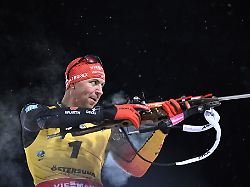DSV athletes race to the top of the world
Biathlon rockets are made from “ridiculous” slats
December 4, 2023, 11:58 a.m
The ban on environmentally harmful fluorine waxes is shaking up the cards in biathlon. The Germans have so far been the big winner of the new regulations. This was not foreseeable just a few weeks ago. Dominator Johannes Thingnes Bö, on the other hand, is very annoyed.
While the German biathletes can’t stop cheering thanks to their “rockets”, the almost unbeatable dominator Johannes Thingnes Bö is suddenly very annoyed. “You used to be able to fly on skis without needing strength in your upper body. That doesn’t work anymore,” complained the Norwegian after three individual races without a win. The four-time overall World Cup winner is extremely upset about the ban on environmentally harmful fluorine waxes.
“Now I’m simply too weak, I need more muscles,” says Bö. He feels “incredibly stupid”. Because suddenly the 30-year-old is no longer conjuring up running records in the snow, the cards have been reshuffled. So far, the German team, which has had a surprisingly strong start, is using the new wax regulations to its advantage. And that after it had already received a mixture of pity and malice in the test races.
“It was terrible to see”
“The Norwegians almost apologized in Sjusjoen because our athletes had no chance because of the material,” said sports director Felix Bitterling: “It was like a car race with 50 hp against 200 hp.” Eight-time Olympic champion Ole Einar Björndalen scoffed that he saw “the Germans running uphill quickly, but they couldn’t keep up at all downhill.” “It looked ridiculous and was terrible to see.”
But the tide turned at the World Cup opener in Östersund. The German material is “far from ridiculous,” emphasized Justus Strelow. “We had rockets under our feet again,” enthused Philipp Nawrath after his debut victory on Saturday. After the fluorine ban, the waxing team is doing “superbly overall,” said Bitterling. So far, well-known chief technician Sebastian Hopf says they have been “at the forefront” – and they immediately put the brakes on the euphoria.
“A lot of trial and error”
“We don’t know how we will fare in wetter conditions,” said the 38-year-old in the “Süddeutsche Zeitung”. And the Scandinavians are “financially and generally ahead. Biathlon is the national sport there, they have a lot more people who are interested in getting involved in ski waxing issues.” There is currently “naturally a lot of trial and error,” explained Bitterling.
“In recent years there has been a huge database on the subject of ski preparation. This complete knowledge is now almost useless because the products no longer exist,” explained the sports director. It is now important to “work out almost everything from scratch.” Therefore, “the frequency of extremes will increase.” It’s “hard work every day,” says Hopf: “It’s become a new science.”
With the fluorine ban, the world association “first and foremost implemented EU legislation,” explained IBU sports director Daniel Böhm on ARD: “We had to follow this legislation.” The skis are checked to ensure they are free of fluorine before and after the races using a hand-held device that contains an infrared sensor. Despite the new types of wax, there are “not that big of a difference when you compare the times at the first World Cup,” emphasized Böhm. But Johannes Thingnes Bö’s personal feeling says something different.
